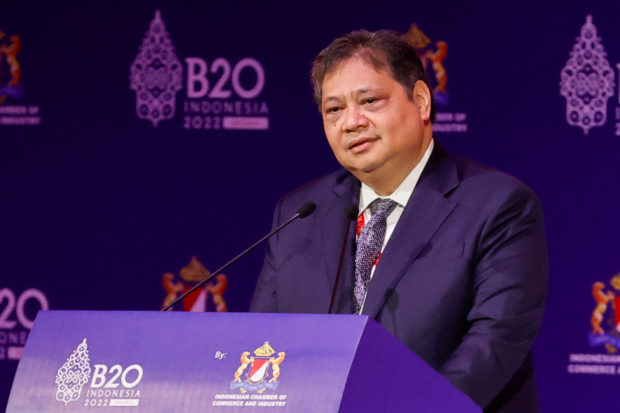Indonesia’s protectionist policies could contravene OECD membership

Indonesian Coordinating Minister for Economic Affairs Airlangga Hartarto delivers his address on Public and Private Partnership to Spur Economic Growth, during the the B20 Summit, ahead of the G20 leaders’ summit, in Nusa Dua, Bali, Indonesia, November 14, 2022. REUTERS/Willy Kurniawan
JAKARTA – Indonesia has made further progress toward joining the Organization for Economic Co-operation and Development (OECD) after the country received its accession roadmap to joining the club, but analysts warn there will be a price to pay despite the benefits.
OECD secretary-general Mathias Cormann formally delivered the accession road map to Coordinating Economic Minister Airlangga Hartarto in Paris on Thursday.
The road map sets out the terms, conditions, and process for accession and reflects priority areas identified by OECD members that are required for accession.
“The accession road map sets out the path for Indonesia to achieve alignment with OECD standards and best practices, anchoring a reform agenda in support of its vision of becoming an advanced economy by 2045,” Cormann said in a press statement on Thursday.
During the ensuing accession process, Indonesia will face a series of technical reviews that cover open trade and investment, public governance, integrity, and anti-corruption efforts, as well as effective protection of the environment and action on the climate, among many other areas of public policy.
At the end of the process, the OECD Council will decide on whether to invite Indonesia to accede to membership.
The OECD is known as the “rich-country club” with its state members representing 80 percent of the world’s trade and investment.
Best policies and practices
OECD membership is expected to bring many benefits, especially in investment and trade as its members adopt some of the “best policies and practices”, with which business players are familiar and needed when conducting investment or trade.
However, experts believe that Indonesia’s ascension will not be a walk in the park, as the country could find itself contravening many of those principles, and adhering to them could cost the nation several of the policies it has heretofore relied on.
There are at least 270 international standards a candidate member must meet and, summarized in Indonesia’s road map, are seven main policy areas, including open trade and investment that say “we believe in open and transparent market economy principles”.
However, in recent years the country has put into effect protectionist measures, for instance, a nickel ore export ban, in a bid to kick-start nickel industrialization onshore, which many analysts believe clashes with the idea of an open market.
Muhammad Habib, a researcher from the Centre for Strategic and International Studies (CSIS), told The Jakarta Post on Friday this was just one concrete example of where Indonesia might meet a concrete wall due to contradictions with the OECD’s ideas.
Other contradictory policies include local content requirements and their prioritization for state-owned enterprises (SOEs), which it is claimed create an unlevel playing field in the domestic market.
Asked whether Indonesia will change its stance on these matters, Habib said: “it all depends on the government’s commitment” and how fast it is planning to join.
He went on to say that the lower “degree of flexibility in making regulations” or shrinking “policy space” was the potential loss that Indonesia might incur from membership since the country would have no choice but to comply.
“Indonesia is not in a position to bargain since we are the one who wants to join,” said Habib.
Moreover, the OECD statement also says “as a result of technical reviews, committees may recommend changes to Indonesia’s legislation, policy and practices to bring them further into line with OECD standards and best practices”.
Roadmap to accession
On the other hand, European Union countries, which Habib considers to be “founder countries”, could take nationalist or protectionist measures, like the EU Deforestation Regulation, without risking any serious consequence to their club membership status.
Concurring, Institute of Development on Economics and Finance (Indef) deputy director Eko Listiyanto told the Post on Friday that Indonesia would have no choice but “to abide” and “the restrictions” were part of “the side effects”.
Edi Prio Pambudi, undersecretary for international cooperation at the Office of the Coordinating Economic Minister, told the Post on Friday that he was confident about Indonesia’s accession, as there are “mechanisms” in the OECD that might still provide some leeway.
“If the [OECD] limits [countries], there won’t be that many countries lining up to join,” said Edi.
Airlangga previously said on Feb. 28 that each country would still “have sovereignty to formulate their own regulations” since best practices do not necessarily translate into uniformity, “as long as the value that is upheld remains the same”.
Similarly, Deputy Foreign Minister Pahala Mansury also said on Feb. 28 that becoming an OECD member did not mean Indonesia should follow all the requirements proposed by the members.
“When the road map is out, we will discuss together what must be reformed and what need not be. So, we don’t have to accept it as is. In every accession process there are such [compromises],” said Pahala.